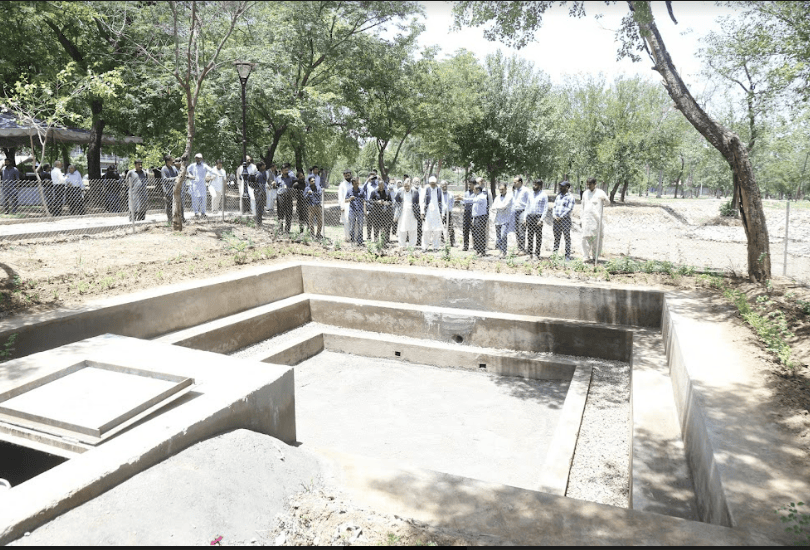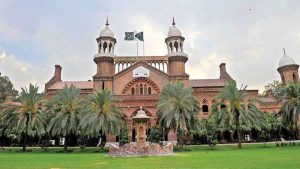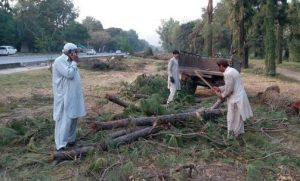ISLAMABAD – The International Water Management Institute (IWMI) on Friday inaugurated the artificial groundwater recharge site in Kachnar Park, with the collaboration Pakistan Council of Research in Water Resources (PCRWR) and WaterAid Pakistan.
The site has been implemented under the project “Demonstration of nature-based solutions for improving the resilience of groundwater aquifers in Islamabad”. The project, funded by WaterAid, has identified seven potential groundwater recharge sites in the federal capital.
Dr. Mohsin Hafeez, Country Representative, IWMI Pakistan, while talking to the media, stressed the need to highlight water challenges, which have increased due to wastage of rainwater and horizontal expansion of the capital city, over-abstraction of groundwater resources, poor water supply, sanitation and hygiene issues, and unsustainable use.
Islamabad receives 1,400mm of rain on average annually, he said and by conserving only 30 per cent of rainwater through artificial groundwater recharge sites we can bridge the demand for 46 million gallons of water per day against the 45 million gallons per day supply.
He said and added our organisation has developed the first state-of-the-art artificial groundwater recharge pilot site equipped with complete instrumentation to measure groundwater quality, groundwater level, rainfall, and the amount of rainfall injected into the aquifer.
“This project will provide evidence-based information on rainfall contribution towards groundwater replenishment and to overcome water scarcity challenges, IWMI Pakistan has recommended CDA to install rainwater harvesting tank at the household level”, Mohsin expressed.
Dr Muhammad Ashraf, Chairman, PCRWR, said the solution to the water supply challenge is linked with rainwater harvesting for groundwater recharge, which needs to be upscaled to address groundwater depletion issues.
He highlighted that the annual average rainfall in Islamabad is about 1.3 m while groundwater depletion is about 1 m annually. It means that if we conserve the available rainwater potential efficiently through recharge, we could easily manage the demand and supply gap through groundwater.
Muhammad Yahya Akhunzada, Joint Secretary (Admin), Ministry of Water Resources, urged the media to sensitize the public on rainwater harvesting for watering plants and conserving water resources at large.
Capital Development Authority (CDA) official Rana Shakeel Asghar, appreciated the efforts of IWMI, PCRWR, and WaterAid Pakistan in piloting the initiative and hoped that it will help to recharge groundwater.
He said that keeping in view the increasing water requirements of Islamabad, rainwater harvesting is important to recharge groundwater. For this purpose, 100 groundwater recharge sites are being constructed by CDA in collaboration with PCRWR, and CDA plans to further increase the number of groundwater recharge sites across the city.
Arif Jabbar Khan, Country Director Pakistan for WaterAid, said that Pakistan is faced with challenges related to drinking water, both in terms of quality and quantity of surface and groundwater.
He said piloting and testing sustainable models that can be replicated by the public and private sectors is a key objective of WaterAid. Besides piloting this groundwater recharge model, WaterAid has developed and tested community-owned and managed water treatment plants and rural and urban wastewater treatment systems, etc.
“We will continue to support the people and government of Pakistan in meeting their WASH challenges through such efforts,” he added.
Kachnar Park was selected for its excellent rainwater availability and suitable underground storage capacity of three feet deep, and 566,000 liters of water. Experts pointed out that the twin cities would likely receive 40pc more spots of rain this monsoon season.













